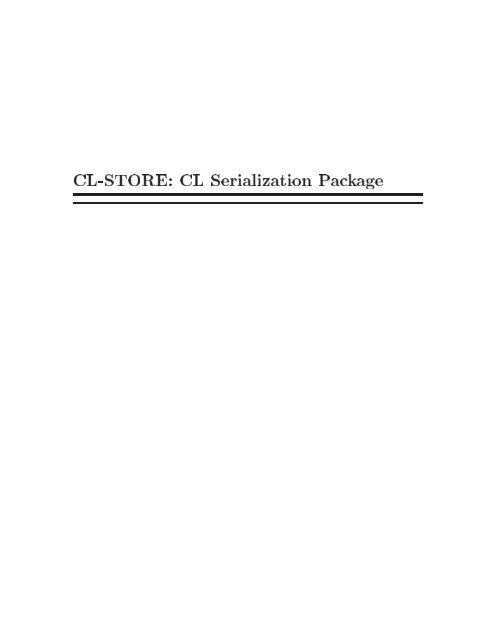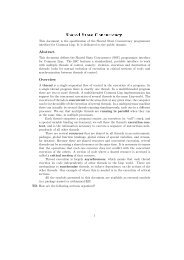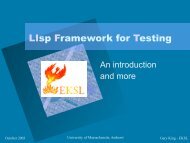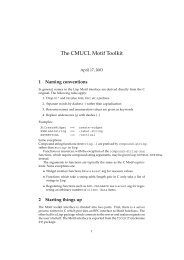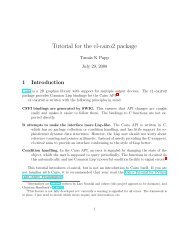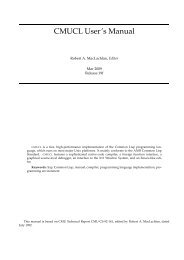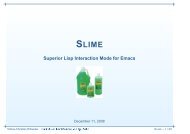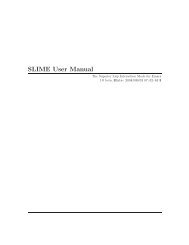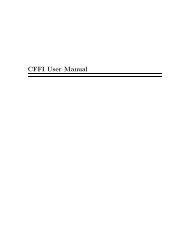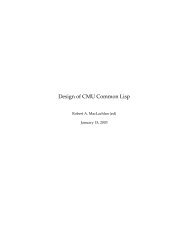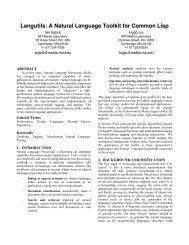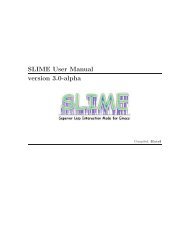CL-STORE: CL Serialization Package - Common Lisp.net
CL-STORE: CL Serialization Package - Common Lisp.net
CL-STORE: CL Serialization Package - Common Lisp.net
- No tags were found...
You also want an ePaper? Increase the reach of your titles
YUMPU automatically turns print PDFs into web optimized ePapers that Google loves.
<strong>CL</strong>-<strong>STORE</strong>: <strong>CL</strong> <strong>Serialization</strong> <strong>Package</strong>
Copyright c (c) (C) 2004 Sean Ross All rights reserved.Redistribution and use in source and binary forms, with or without modication, are permittedprovided that the following conditions are met: 1. Redistributions of source codemust retain the above copyright notice, this list of conditions and the following disclaimer.2. Redistributions in binary form must reproduce the above copyright notice, this list ofconditions and the following disclaimer in the documentation and/or other materials providedwith the distribution. 3. The names of the authors and contributors may not be usedto endorse or promote products derived from this software without specic prior writtenpermission.THIS SOFTWARE IS PROVIDED BY THE AUTHORS AND CONTRIBUTORS "AS IS"AND ANY EXPRESS OR IMPLIED WARRANTIES, IN<strong>CL</strong>UDING, BUT NOT LIMITEDTO, THE IMPLIED WARRANTIES OF MERCHANTABILITY AND FITNESS FOR APARTICULAR PURPOSE ARE DIS<strong>CL</strong>AIMED. IN NO EVENT SHALL THE AUTHORSOR CONTRIBUTORS BE LIABLE FOR ANY DIRECT, INDIRECT, INCIDENTAL,SPECIAL, EXEMPLARY, OR CONSEQUENTIAL DAMAGES (IN<strong>CL</strong>UDING, BUT NOTLIMITED TO, PROCUREMENT OF SUBSTITUTE GOODS OR SERVICES; LOSS OFUSE, DATA, OR PROFITS; OR BUSINESS INTERRUPTION) HOWEVER CAUSEDAND ON ANY THEORY OF LIABILITY, WHETHER IN CONTRACT, STRICT LIA-BILITY, OR TORT (IN<strong>CL</strong>UDING NEGLIGENCE OR OTHERWISE) ARISING IN ANYWAY OUT OF THE USE OF THIS SOFTWARE, EVEN IF ADVISED OF THE POSSI-BILITY OF SUCH DAMAGE.
iTable of Contents1 Introduction. . . . . . . . . . . . . . . . . . . . . . . . . . . . . . . 11.1 Example. . . . . . . . . . . . . . . . . . . . . . . . . . . . . . . . . . . . . . . . . . . . . . . . . . . . 11.2 Supported Objects . . . . . . . . . . . . . . . . . . . . . . . . . . . . . . . . . . . . . . . . . . 11.3 Supported Implementations . . . . . . . . . . . . . . . . . . . . . . . . . . . . . . . . . . 12 Getting Started. . . . . . . . . . . . . . . . . . . . . . . . . . . . 22.1 Downloading . . . . . . . . . . . . . . . . . . . . . . . . . . . . . . . . . . . . . . . . . . . . . . . . 22.2 Installing . . . . . . . . . . . . . . . . . . . . . . . . . . . . . . . . . . . . . . . . . . . . . . . . . . . 22.3 Testing . . . . . . . . . . . . . . . . . . . . . . . . . . . . . . . . . . . . . . . . . . . . . . . . . . . . . 23 API. . . . . . . . . . . . . . . . . . . . . . . . . . . . . . . . . . . . . . . 33.1 Variables . . . . . . . . . . . . . . . . . . . . . . . . . . . . . . . . . . . . . . . . . . . . . . . . . . . 33.2 Functions . . . . . . . . . . . . . . . . . . . . . . . . . . . . . . . . . . . . . . . . . . . . . . . . . . . 43.3 Macros . . . . . . . . . . . . . . . . . . . . . . . . . . . . . . . . . . . . . . . . . . . . . . . . . . . . . 43.4 Conditions . . . . . . . . . . . . . . . . . . . . . . . . . . . . . . . . . . . . . . . . . . . . . . . . . . 44 Customizing . . . . . . . . . . . . . . . . . . . . . . . . . . . . . . . 54.1 About Customizing. . . . . . . . . . . . . . . . . . . . . . . . . . . . . . . . . . . . . . . . . . 54.2 Customizing API . . . . . . . . . . . . . . . . . . . . . . . . . . . . . . . . . . . . . . . . . . . . 64.2.1 Functions . . . . . . . . . . . . . . . . . . . . . . . . . . . . . . . . . . . . . . . . . . . . . . 64.2.2 Macros. . . . . . . . . . . . . . . . . . . . . . . . . . . . . . . . . . . . . . . . . . . . . . . . . 75 New Backends . . . . . . . . . . . . . . . . . . . . . . . . . . . . . 95.1 About . . . . . . . . . . . . . . . . . . . . . . . . . . . . . . . . . . . . . . . . . . . . . . . . . . . . . . 95.2 The Process . . . . . . . . . . . . . . . . . . . . . . . . . . . . . . . . . . . . . . . . . . . . . . . . 95.2.1 Add the backend . . . . . . . . . . . . . . . . . . . . . . . . . . . . . . . . . . . . . . . 95.2.2 Recognizing Objects. . . . . . . . . . . . . . . . . . . . . . . . . . . . . . . . . . . . . 95.2.3 Extending the Resolving backend . . . . . . . . . . . . . . . . . . . . . . . 105.3 Example: Simple Pickle Format . . . . . . . . . . . . . . . . . . . . . . . . . . . . . 105.3.1 Dene the backend. . . . . . . . . . . . . . . . . . . . . . . . . . . . . . . . . . . . . 105.3.2 Recognize Objects . . . . . . . . . . . . . . . . . . . . . . . . . . . . . . . . . . . . . 115.3.3 Test the new Backend. . . . . . . . . . . . . . . . . . . . . . . . . . . . . . . . . . 115.4 API . . . . . . . . . . . . . . . . . . . . . . . . . . . . . . . . . . . . . . . . . . . . . . . . . . . . . . . 125.4.1 Functions . . . . . . . . . . . . . . . . . . . . . . . . . . . . . . . . . . . . . . . . . . . . . 125.4.2 Macros. . . . . . . . . . . . . . . . . . . . . . . . . . . . . . . . . . . . . . . . . . . . . . . . 126 Notes . . . . . . . . . . . . . . . . . . . . . . . . . . . . . . . . . . . . 136.1 Backend Designators . . . . . . . . . . . . . . . . . . . . . . . . . . . . . . . . . . . . . . . 136.2 Known Issues . . . . . . . . . . . . . . . . . . . . . . . . . . . . . . . . . . . . . . . . . . . . . . 136.3 Regarding String <strong>Serialization</strong> . . . . . . . . . . . . . . . . . . . . . . . . . . . . . . . 13
Chapter 1: Introduction 11 Introduction<strong>CL</strong>-<strong>STORE</strong> is a portable serialization package for <strong>Common</strong> <strong>Lisp</strong> which allows the readingand writing of most objects found in <strong>Common</strong> <strong>Lisp</strong> resolving any circularities which itdetects. It is intended to serve the same purpose as Java's ObjectOutput and ObjectInput-Stream, although it's somewhat more extensible.The <strong>CL</strong>-<strong>STORE</strong> Home Page is at http://common-lisp.<strong>net</strong>/project/cl-store whereone can nd details about mailing lists, cvs repositories and various releases.This documentation is for <strong>CL</strong>-<strong>STORE</strong> version 0.6 .Enjoy Sean.1.1 Example(defclass myclass () ((a :accessor a :initarg :a)))(cl-store:store (make-instance 'myclass :a 3) "/tmp/test.out")(a (cl-store:restore "/tmp/test.out"))1.2 Supported Objects Numbers (oats, integers, complex, NaN oats, rationals) Strings (Supports Unicode Strings) Characters Symbols <strong>Package</strong>s HashTables Lists Vectors And Arrays Instances of <strong>CL</strong>OS Classes <strong>CL</strong>OS Classes Structure Instances Structure Denitions (CMU<strong>CL</strong> and SB<strong>CL</strong> only) Functions (stores the function name) Generic Functions (stores generic-function-name)1.3 Supported Implementations SB<strong>CL</strong> CMU<strong>CL</strong> <strong>CL</strong>ISP <strong>Lisp</strong>works Allegro <strong>CL</strong> OpenM<strong>CL</strong> E<strong>CL</strong>
Chapter 2: Getting Started 22 Getting Started<strong>CL</strong>-<strong>STORE</strong> uses asdf as it's system denition tool and is required whenever you load thepackage. You will need to download it, or if you have sbcl (require 'asdf)2.1 Downloading ASDF-INSTALL <strong>CL</strong>-<strong>STORE</strong> is available through asdf-install. If you are new to <strong>Common</strong><strong>Lisp</strong> this is the suggested download method. With asdf-install loaded run (asdfinstall:install:cl-store) This will download and install the package for you.Asdf-install will try to verify that the package signature is correct and that you trustthe author. If the key is not found or the trust level is not sucient a continuableerror will be signalled. You can choose to ignore the error and continue to install thepackage. See the documentation of asdf-install for more details. DOWNLOADThe latest cl-store release will always be available from cl.<strong>net</strong>. Download anduntar in an appropriate directory then symlink `cl-store.asd' to a directory onasdf:*central-registry* (see the documentation for asdf for details about settingup asdf). CVSIf you feel the need to be on the bleeding edge you can use anonymous CVS access, seethe Home Page for more details for accessing the archive. Once downloaded follow thesymlink instructions above.2.2 InstallingOnce downloaded and symlinked you can load <strong>CL</strong>-<strong>STORE</strong> at anytime using (asdf:oos'asdf:load-op :cl-store) This will compile <strong>CL</strong>-<strong>STORE</strong> the rst time it is loaded.2.3 TestingOnce installed you can run the regression tests for it. The tests depend on the RegressionTests asdf package which is asdf-installable. The tests can be run be executing (asdf:oos'asdf:test-op :cl-store)If any tests fail please send a message to one of the Mailing Lists.
Chapter 3: API 33 API3.1 Variables[Variable]Determines wether or not to override existing classes when restoring a <strong>CL</strong>OS Class.If *nuke-existing-classes* is not NIL the current denition will be overridden.*nuke-existing-classes* Default NIL[Variable]If *store-class-superclasses* is not NIL when storing a <strong>CL</strong>OS Class all superclasseswill be stored.*store-class-superclasses* Default NIL[Variable]If *store-class-slots* is NIL slots which are class allocated will not be serializedwhen storing objects.*store-class-slots* Default T[Variable]If *nuke-existing-packages* is non-nil then packages which already exist will bedeleted when restoring packages.*nuke-existing-packages* Default NIL[Variable]The variable determines how packages on a package use list will be serialized. If nonnilthe the package will be fully serialized, otherwise only the name will be stored.*store-used-packages* Default NIL[Variable]The default size of the hash-table created to keep track of objects which have alreadybeen stored. By binding the variable to a suitable value you can avoid the consinginvolved by rehashing hash-tables.*store-hash-size* Default 50[Variable]The default size of the hash-table created to keep track of objects which have alreadybeen restored. By binding the variable to a suitable value you can avoid the consinginvolved by rehashing hash-tables.*restore-hash-size* Default 50[Variable]Binding this variable to nil when storing or restoring an object inhibits all checksfor circularities which gives a severe boost to performance. The downside of this isthat no restored objects will be eq and attempting to store circular objects will hang.The speed improvements are denitely worth it if you know that there will be nocircularities or shared references in your data (eg spam-lter hash-tables).*check-for-circs* Default t*default-backend*The backend that will be used by default.[Variable]
Chapter 3: API 43.2 Functions[Generic]Stores object into place using backend. Place must be either a stream or a pathnamedesignator.All conditions signalled from store can be handled by catching storeerror.If the store-error is not handled the causing error will be signalled.store object place &optional (backend *default-backend*)[Generic]Restores an object serialized using store from place using backend. Place must beeither a stream or a pathname-designator. Restore is setable eg.(store 0 "/tmp/counter")(incf (restore "/tmp/counter"))All conditions signalled from restore can be handled by catching restore-error. Ifthe restore-error is not handled the causing error will be signalled.restore place &optional (backend *default-backend*)[Function]Return backup called name. If there is no such backend NIL is returned if errorp isfalse, otherwise an error is signalled.find-backend name &optional (errorp nil)caused-by cl-store-errorReturns the condition which caused cl-store-error to be signalled.3.3 Macros[Function][Macro]Execute body with *default-backend* bound to the backend designated by backend.with-backend backend &body body3.4 Conditionscl-store-error[Condition]Class Precedence: conditionRoot <strong>CL</strong>-<strong>STORE</strong> Condition all errors occuring while storing or restoring can behandled by catching cl-store-errorstore-error[Condition]Class Precedence: cl-store-errorA store-error will be signalled when an error occurs within store or multiplevalue-store.The causing error can be obtained using (caused-by condition)restore-error[Condition]Class Precedence: cl-store-errorA restore-error will be signalled when an error occurs within restore. The causingerror can be obtained using (caused-by condition)
Chapter 4: Customizing 54 Customizing4.1 About CustomizingEach backend in <strong>CL</strong>-<strong>STORE</strong> can be customized to store various values in a custom manner.By using the defstore- and defrestore- macros youcan dene your own methods for storing various objects. This may require a marginalunderstanding of the backend you wish to extend.eg.(in-package :cl-user)(use-package :cl-store)(setf *default-backend* (find-backend 'cl-store));; Create the custom class(defclass random-obj () ((a :accessor a :initarg :a)));; Register random object. This is specific to the;; cl-store-backend.(defvar *random-obj-code* (register-code 110 'random-obj));; Create a custom storing method for random-obj;; outputting the code previously registered.(defstore-cl-store (obj random-obj stream)(output-type-code *random-obj-code* stream)(store-object (a obj) stream));; Define a restoring method.(defrestore-cl-store (random-obj stream)(random (restore-object stream)));; Test it out.(store (make-instance 'random-obj :a 10) "/tmp/random")(restore "/tmp/random")=> ; some number from 0 to 9If you need to get fancier take a look at the macroexpansion of the customizing macros.
Chapter 4: Customizing 64.2 Customizing APIThis API is primarily concerned with the cl-store-backend although other backends will besimilar in structure.4.2.1 Functions[Function]Registers name under the code code into the cl-store-backend. The backend will usethis mapping when restoring values. Will signal an error if code is already registeredand errorp is not NIL. Currently codes 1 through 35 are in use.register-code code name &optional (errorp t)[Function]Writes type-code into stream. This must be done when writing out objects so thatthe type of the object can be identied on deserialization.output-type-code type-code streamstore-32-bit integer streamOutputs the the low 32 bits from integer into stream.read-32-bit streamReads a 32-bit integer from stream.[Function][Function][Generic]Stores object into place. This should be used inside defstore-cl-store to outputparts of objects. store should not be used.store-object object placerestore-object placeRestore an object, written out using store-object from place.[Generic][Generic]Generic function which returns a list of slots details which can be used as an argumentto ensure-class. Currently it is only specialized on slot-denitionget-slot-details slot-denition[Generic]Method which returns a list of slot-denition objects which will be serialized for object.The default is to call serializable-slots-using-class.serializable-slots object[Generic]Returns a list of slot-denition objects which will be serialized for object and class.Example. When serializing cl-sql objects to disk or to another lisp session the viewdatabaseslot should not be serialized. Instead of specializing serializable-slots foreach view-class created you can do this.(defmethod serializable-slots-using-class((object t) (class clsql-sys::standard-db-class))(delete 'clsql-sys::view-database (call-next-method):key 'slot-definition-name))serializable-slots-using-class object class
Chapter 4: Customizing 74.2.2 Macros[Macro]Create a custom storing mechanism for type which must be a legal Class Name. Bodywill be called when an object of class type is stored using store-object with varbound to the object to be stored and stream bound to the stream to output to. Ifqualier is given it must be a legal qualier to defmethod. Example.(defstore-cl-store (obj ratio stream)(output-type-code +ratio-code+ stream)(store-object (numerator obj) stream)(store-object (denominator obj) stream))defstore-cl-store (var type stream &key qualier) &body body[Macro]Create a custom restoring mechanism for the type registered using registercode.Bodywill be executed with stream being the input stream to restore an objectfrom.Example.(defrestore-cl-store (ratio stream)(/ (restore-object stream)(restore-object stream)))defrestore-cl-store (type stream) &body body[Macro]Executes body resolving circularities detected in object. Resolving-object works bycreating a closure, containing code to set a particular place in object, which is thenpushed onto a list. Once the object has been fully restored all functions on this listare called and the circularities are resolved. Example.(defrestore-cl-store (cons stream)(resolving-object (object (cons nil nil))(setting (car object) (restore-object stream))(setting (cdr object) (restore-object stream))))resolving-object (var create) &body body
Chapter 4: Customizing 8[Macro]This macro can only be used inside resolving-object. It sets the value designatedby place to get for the object that is being resolved.Example.(defrestore-cl-store (simple-vector stream)(let* ((size (restore-object stream))(res (make-array size)))(resolving-object (object res)(loop repeat size for i from 0 do;; we need to copy the index so that;; it's value is preserved for after the loop.(let ((x i))(setting (aref object x) (restore-object stream)))))res))setting place get[Macro]setting-hash works identically to setting although it is used exclusively on hashtablesdue to the fact that both the key and the value being restored could be acircular reference. Example.(defrestore-cl-store (hash-table stream)(let ((rehash-size (restore-object stream))(rehash-threshold (restore-object stream))(size (restore-object stream))(test (restore-object stream))(count (restore-object stream)))(let ((hash (make-hash-table :test (symbol-function test):rehash-size rehash-size:rehash-threshold rehash-threshold:size size)))(resolving-object (obj hash)(loop repeat count do(setting-hash (restore-object stream)(restore-object stream))))hash)))setting-hash getting-key getting-value
Chapter 5: New Backends 95 New Backends5.1 AboutYou can dene your own backends in cl-store to do custom object I/O. Theoretically onecan add a backend that can do socket based communication with any language providedyou know the correct format to output objects in. If the framework is not sucient to addyour own backend just drop me a line and we will see what we can do about it.5.2 The Process5.2.1 Add the backendUse defbackend to dene the new backend choosing the output format, an optional magicnumber, extra elds for the backend and a backend to extend which defaults to the basebackend. eg. (from the cl-store-backend)(defbackend cl-store :magic-number 1347643724:stream-type '(unsigned-byte 8):old-magic-numbers (1912923 1886611788 1347635532):extends resolving-backend:fields ((restorers :accessor restorers :initform (make-hash-table))))5.2.2 Recognizing Objects.Decide how to recognize objects on restoration. When restoring objects the backend has aresponsibility to return a symbol identifying the defrestore method to call by overridingthe get-next-reader method. In the cl-store backend this is done by keeping a mappingof type codes to symbols. When storing an object the type code is written down the streamrst and then the restoring details for that particular object. The get-next-reader methodis then specialized to read the type code and look up the symbol in a hash-table kept onthe backend.eg. (from the cl-store-backend)(defvar *cl-store-backend* (find-backend 'cl-store));; This is a util method to register the code with a symbol(defun register-code (code name &optional (errorp t))(aif (and (gethash code (restorers *cl-store-backend*)) errorp)(error "Code ~A is already defined for ~A." code name)(setf (gethash code (restorers *cl-store-backend*))name))code);; An example of registering the code 7 with ratio(defconstant +ratio-code+ (register-code 7 'ratio));; Extending the get-next-reader method(defmethod get-next-reader ((backend cl-store) (stream stream))(let ((type-code (read-type-code stream)))(or (gethash type-code (restorers backend))
Chapter 5: New Backends 10(values nil (format nil "Type ~A" type-code)))))(defstore-cl-store (obj ratio stream)(output-type-code +ratio-code+ stream) ;; output the type code(store-object (numerator obj) stream)(store-object (denominator obj) stream))5.2.3 Extending the Resolving backendIf you are extending the resolving-backend you have a couple of extra responsibilities toensure that circular references are resolved correctly. Store-referrer must be extendedfor your backend to output the referrer code. This must be done as if it were a defstore fora referrer. A defrestore- must also be dened for the referrer which mustreturn a referrer created with make-referrer. Once that is done you can use resolvingobjectand setting to resolve circularities in objects.eg (from the cl-store backend)(defconstant +referrer-code+ (register-code 1 'referrer nil))(defmethod store-referrer (ref stream (backend cl-store))(output-type-code +referrer-code+ stream)(store-32-bit ref stream))(defrestore-cl-store (referrer stream)(make-referrer :val (read-32-bit stream nil)))5.3 Example: Simple Pickle FormatAs a short example we will dene a backend that can handle simple objects using the pythonpickle format.5.3.1 Dene the backend(in-package :cl-user)(use-package :cl-store)(defbackend pickle :stream-type 'character)
Chapter 5: New Backends 115.3.2 Recognize ObjectsThis is just a simple example to be able to handle single strings stored with Python's picklemodule.(defvar *pickle-mapping*'((#\S . string)))(defmethod get-next-reader ((backend pickle) (stream stream))(let ((type-code (read-char stream)))(or (cdr (assoc type-code *pickle-mapping*))(values nil (format nil "Type ~A" type-code)))))(defrestore-pickle (noop stream))(defstore-pickle (obj string stream)(format stream "S'~A'~%p0~%." obj))(defrestore-pickle (string stream)(let ((val (read-line stream)))(read-line stream) ;; remove the PUSH op(read-line stream) ;; remove the END op(subseq val 1 (1- (length val)))))5.3.3 Test the new Backend.This can be tested with the codePython>>> import pickle>>> pickle.dump('Foobar', open('/tmp/foo.p', 'w'))<strong>Lisp</strong>* (cl-store:restore "/tmp/foo.p" 'pickle)=> "Foobar"And<strong>Lisp</strong>* (cl-store:store "BarFoo" "/tmp/foo.p" 'pickle)Python>>> pickle.load(open('/tmp/foo.p'))'BarFoo'
Chapter 5: New Backends 125.4 API5.4.1 Functions[Generic]Restore the object found in stream place using backend backend. Checks the magicnumberand invokes backend-restore-object. Called by restore, override for customrestoring.backend-restore backend place[Generic]Find the next function to call to restore the next object with backend and invoke itwith place. Called by restore-object, override this method to do custom restoring(see `circularities.lisp' for an example).backend-restore backend place[Generic]Stores the backend code and calls store-object. This is called by store. Overridefor custom storing.backend-store backend place obj[Generic]Called by store-object, override this to do custom storing (see`circularities.lisp' for an example).backend-store-object backend obj place[Generic]Method which must be specialized for backend to return the next symbol designatinga defrestore instance to restore an object from place. If no reader is found return asecond value which will be included in the error.get-next-reader backend place5.4.2 Macrosdefbackend name &key (stream-type (required-arg "stream-type")) [Macro]magic-number elds (extends 'backend) old-magic-numberseg. (defbackend pickle :stream-type 'character) This creates a new backendcalled name, stream-type describes the type of stream that the backend will serializeto which must be suitable as an argument to open. Magic-number, when present, mustbe of type (unsigned-byte 32) which will be written as a verier for the backend. Fieldsare extra elds to be added to the new class which will be created. By default theextends keyword is backend,the root backend, but this can be any legal backend. Oldmagic-numbersholds previous magic-numbers that have been used by the backend toidentify incompatible versions of objects stored.
Briloner Leuchten GmbHIm Kissen 259929 BrilonTelefon +49 (0) 2961 / 9712 - 0Fax +49 (0) 2961 / 9712 - 195mail@briloner.dewww.briloner.deWegbeschreibungA445/A46 bis zum Ende der Autobahn (Bestwig). Dann B7 in RichtungBrilon. Ca. 3 km nach der Ortschaft Altenbüren biegen Sie links auf dieB480 / B7 Richtung Flugplatz ab. Dem Verlauf der Straße ca. 4 kmfolgen (über die Ampelkreuzung und über die nächste Kreuzung) biszum Abzweig Alme, Nehden. Dort rechts und gleich nach 50 m links abRichtung Alme, Nehden. Nach der Unterführung rechts in die Straße„Im Kissen“ (Gewerbegebiet Nord). Dort finden Sie uns nach ca. 200 mauf der linken Seite.B480K16K57B480B7 AltenbürenBrilonB7Richtung DortmundMeschedeA46 BestwigK16OlsbergB251Nehdener WegB480B480B7K59 AltenbürenB7Brilon17
Chapter 7: Credits 147 CreditsThanks To <strong>Common</strong>-<strong>Lisp</strong>.<strong>net</strong>: For project hosting. Alain Picard : Structure Storing and support for Innite Floats for <strong>Lisp</strong>works. Robert Sedgewick: <strong>Package</strong> Imports for OpenM<strong>CL</strong> and suggesting Multiple Backends. Thomas Stenhaug: Comprehensive package storing and miscellaneous improvements. Killian Sprotte: Type specication xups.
Chapter 8: Index 158 Index8.1 Function IndexBbackend-restore . . . . . . . . . . . . . . . . . . . . . . . . . . . . 12backend-store . . . . . . . . . . . . . . . . . . . . . . . . . . . . . . 12backend-store-object. . . . . . . . . . . . . . . . . . . . . . . 12Ccaused-by. . . . . . . . . . . . . . . . . . . . . . . . . . . . . . . . . . . . 4Ddefbackend . . . . . . . . . . . . . . . . . . . . . . . . . . . . . . . . . 12defrestore-cl-store . . . . . . . . . . . . . . . . . . . . . . . . . 7defstore-cl-store . . . . . . . . . . . . . . . . . . . . . . . . . . . 7Ffind-backend . . . . . . . . . . . . . . . . . . . . . . . . . . . . . . . . 4Gget-next-reader . . . . . . . . . . . . . . . . . . . . . . . . . . . . 12get-slot-details . . . . . . . . . . . . . . . . . . . . . . . . . . . . 6Ooutput-type-code . . . . . . . . . . . . . . . . . . . . . . . . . . . . 6Rread-32-bit . . . . . . . . . . . . . . . . . . . . . . . . . . . . . . . . . 6register-code . . . . . . . . . . . . . . . . . . . . . . . . . . . . . . . 6resolving-object . . . . . . . . . . . . . . . . . . . . . . . . . . . . 7restore . . . . . . . . . . . . . . . . . . . . . . . . . . . . . . . . . . . . . . 4restore-object . . . . . . . . . . . . . . . . . . . . . . . . . . . . . . 6Sserializable-slots . . . . . . . . . . . . . . . . . . . . . . . . . . 6serializable-slots-using-class . . . . . . . . . . . . . 6setting . . . . . . . . . . . . . . . . . . . . . . . . . . . . . . . . . . . . . . 8setting-hash . . . . . . . . . . . . . . . . . . . . . . . . . . . . . . . . 8store . . . . . . . . . . . . . . . . . . . . . . . . . . . . . . . . . . . . . . . . 4store-32-bit . . . . . . . . . . . . . . . . . . . . . . . . . . . . . . . . 6store-object . . . . . . . . . . . . . . . . . . . . . . . . . . . . . . . . 6Wwith-backend . . . . . . . . . . . . . . . . . . . . . . . . . . . . . . . . 48.2 Variable Index*check-for-circs* . . . . . . . . . . . . . . . . . . . . . . . . . . . 3*default-backend* . . . . . . . . . . . . . . . . . . . . . . . . . . . 3*nuke-existing-classes* . . . . . . . . . . . . . . . . . . . . 3*nuke-existing-packages* . . . . . . . . . . . . . . . . . . . 3*restore-hash-size* . . . . . . . . . . . . . . . . . . . . . . . . . 3*store-class-slots* . . . . . . . . . . . . . . . . . . . . . . . . . 3*store-class-superclasses* . . . . . . . . . . . . . . . . . 3*store-hash-size* . . . . . . . . . . . . . . . . . . . . . . . . . . . 3*store-used-packages*. . . . . . . . . . . . . . . . . . . . . . . 3


